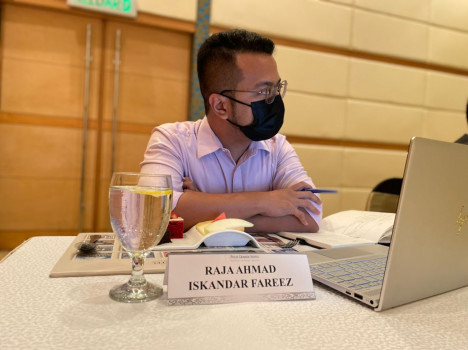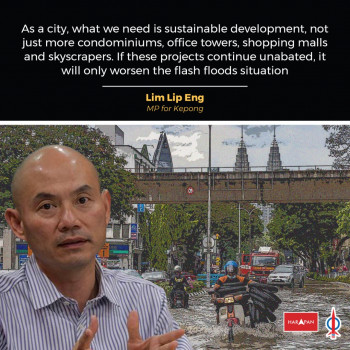by Clarissa Lee
Understanding. Reflection. Humility. Wriggling out of one’s own skin.
For a country half a decade old, we have very little of those qualities. We shout and scream about the injustices and immorality of others, while remaining unaware of how we are complicit in our own prejudices and bigotry.
We rail against neo-imperialism and neo-colonialism, while remaining impervious to how the very set-up of our nation-state, especially our social and economic policies, and daily lifestyle choices, are enabling factors for such ideologies.
For a small nation with policies and social re-engineering plans rolling out year after year in the hope of elevating ourselves into the society of the First World, we create the illusion that we are heading somewhere with the construction of ever-shining new physical artefacts, proud that we are recognised for our famed twin towers, shopping Mecca, investment friendliness, and multiculturalism.
After all, it does not require too much of a mental shift, or deeper revolution, to invest millions in advertisement campaigns touting the brand of “Malaysia, truly Asia,” or having corporate videos to publicise to the world (and our own citizens abroad) about what a wonderful place Kuala Lumpur is, especially if you belong to a certain class of people practising specific professions or are involved in particular businesses.
The “middle class”
For all the decades of planning, beginning with the NEP in the 1970s, all with the hope of creating that middle layer of the bourgeoisie in order to transform our society into one of a modern economic class system in place of feudalism.
Instead, we ended up with a strange juxtaposition of a new class system created through the mini-industrial revolutions of the 1970s and 1980s with that of a feudal system left intact, our nine kings taking their turns to become the next alpha Monarch. However, the zebra does not change its stripes, or the leopard its spots; they merely put on branded new clothes to go with the times.
Moving from feudal privilege to bourgeoisie privilege, those of the pre-independence aristocracy merely re-branded to become active and privileged capital players in the new economy, with a head start.
The rising middle class, some who came from the poor, through hard work and some grit, aided by generous government policies, and who have managed to squeeze into the ranks of the newly rich, holds on to this newfound privilege jealously: who would want to give up a lifestyle one can so comfortably settle into? Yet, this is the very same group that would later hold our nation beholden to all the policies to come, up to this current time. In other words, we are not too far from replicating the class system of our colonial predecessor, except that we are doing it worse.
Mobility and the knowledge gap
There was once a plan, a plan to create social mobility and access for all. But as many economists would tell you, and it does not bear me repeating again, the social and economic gap has widened considerably (a Google search will bring you to speed on all the articles arguing from different ends of the spectrum on this issue).
Now, an additional chasm is included, and this, even in the gilded age of the Internet, is the informational, educational and knowledge gap. The reason this is so is because, even with Malaysia’s attempt at having good informational infrastructural capability, the way in which the information is disseminated has enabled those with greater “insider knowledge,” or the funds to access those knowledge, to hit the ground running.
A child born into a working-class family whose parents have limited education and purview, need to have access in another form that his peer born into a wealthier and more educated family could readily obtain from home.
The necessity increases when the working-class child comes from our version of an inner-city, a small town, or a kampung with less than adequate access to all the “liberal” cultural and “intellectual” activities/events that tend to concentrate around the bigger cities.
This means a good school library, enrichment programmes in public schools done in collaboration with the other institutions (such as universities, research, civic, and creative institutions), strong after-school programmes in music, the arts, literature, science, and shop; well-trained and resourceful school librarians, properly-trained school counsellors, and the best teachers that the Education Ministry could muster (even if it means giving these professionals much higher wages and better benefits to live in less than optimal places).
A better way
The Teach for Malaysia program (modeled after Teach for America) is attempting to do what the government has not been doing with much success, and I hope that there would be greater collaboration on both ends.
Every child with ability, excluding all extenuating circumstances unrelated to his/her nature, should have the right, and even the knowledge, to aspire to be the best he/she could be according to his/her aptitude.
On the question of education, ridiculous amounts of taxpayers’ money are spent on poorly thought-out policies. For example, we go from a corrupted version of affirmative action to a problematic (and misguided) conceptualization of meritocracy.
Every year, we spend millions of ringgit sending students abroad to supposedly top institutions in the world (and even the word “top” merits critique) based on questionable world rankings that do not take into account the actual learning experience of the student, and then fail to tap the knowledge they supposedly have acquired: specialist, dominant and capital-advancing forms of knowledge not found in Malaysia.
Instead, such scholarship programmes, barring some exceptional good that they do, seem to be partly about providing the children of wealthy and connected parents a free ride to greater elite exclusivity.
For all the different knowledge-fields unavailable in Malaysia that are the reason for sending these 18- and 19-year-old “cream-of-the-crop” abroad, we never got around to improving the existing local programmes, or institute new ones. We think that we can ask still rather inexperienced 22- and 23-year-olds to return and make miraculous changes to our country.
However, the entire process of selection lack foresight beyond the superficial expectation of excellent grades acquired in public school exams that are of subjective value, layered over with some ‘evidence’ of strong extra-curricular participation. The mentoring and guidance that will help move the students out of a self-interested mindset into becoming reflective citizens of the world who can connect their experiences to their native land are non-existent. Nor is there guidance that will prepare these graduates to apply their skills creatively in myriad ways.
Great expectations
In the end, some (not all) of these privileged 22- and 23-year-old will come home and expect to be treated a class above the other “proletariats” with their local degrees, given positions to commensurate with their tax-payers funded expensive degrees.
When that fails to materialise, they may decide to leave. Having left the country once in pursuit of a more “world-class” education and having more options than that class of locally-graduated “proletariats”, they could leave anytime and never return (thus the”brain-drain”), with the excuse that they are not appreciated back home. The graduates are not to be blamed, for they are the by-products of a system that privileges prestige and brand name over impactful learning and service.
After all, who cares about the reality of that education if your goal is to acquire a brand name education that will give you a leg-up (and the network) into some fancy consultancy, investment, or other ‘prestigious’ jobs, and thus a meal ticket into that exclusive band. There is nothing wrong in having that desire as long as it is not masked under another pretext.
_______________________________________________
* Clarissa Lee, a Malaysian national, is currently a PhD candidate at Duke, trying to finish her dissertation. She is also a product of a local public university. She tweets as @normasalim. This article was first published in The Malaysian Insider



